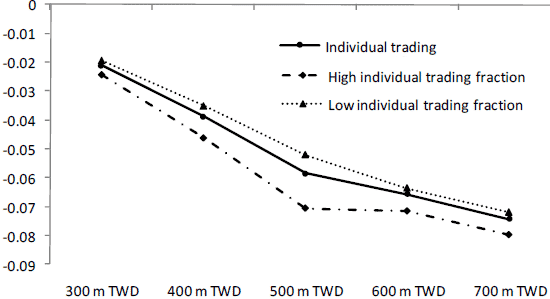How much individual investing is lottery-like, just hoping for a big score with no analysis? In their June 2010 paper entitled “Natural Experiments on Individual Trading: Substitution Effect Between Stock and Lottery”, Xiaohui Gao and Tse-Chun Lin relate individual trading activity to national lottery jackpot size in Taiwan. Using twice-weekly lottery jackpots and contemporaneous Taiwan Stock Exchange individual trading data at the market and firm levels spanning 2002-2009 (1,495 lottery drawings), they find that:
- A lottery jackpot size exceeding 500 million Taiwan dollars (TWD), roughly $16 million U.S. dollars, depresses the number of shares traded by individual investors by 5.9%. The magnitude of the effect varies from 2.1% to 7.4% as the jackpot threshold increases from 300 million to 700 million TWD. (See the chart below.)
- At the …firm level, the number of shares traded by individuals drops by 7% if there is a large lottery jackpot drawing on the same day.
- This substitution effect is stronger among stocks with high individual trading fraction, small market capitalization, low price, high past return and turnover, and high idiosyncratic volatility.
- This substitution effect may derive from individual desires for entertainment, sensation-seeking and gambling.
The following chart, taken from the paper, shows the progressive depression of stock trading by individuals in percent for lottery jackpot thresholds of 300, 400, 600 and 700 million TWD for all stocks and for stocks expected to have high and low individual trading participation. The effect grows monotonically in magnitude from 2.1% to 7.4% as the jackpot threshold increases from from 300 million TWD to 700 million TWD. The effect is generally stronger (weaker) for stocks with high (low) individual trading participation.

In summary, evidence indicates that gambling opportunities displace stock trading for some individuals (in other words, stock trading is equivalent to gambling for some people).
By extension, betting on major sports events may also depress noise trading in stocks.